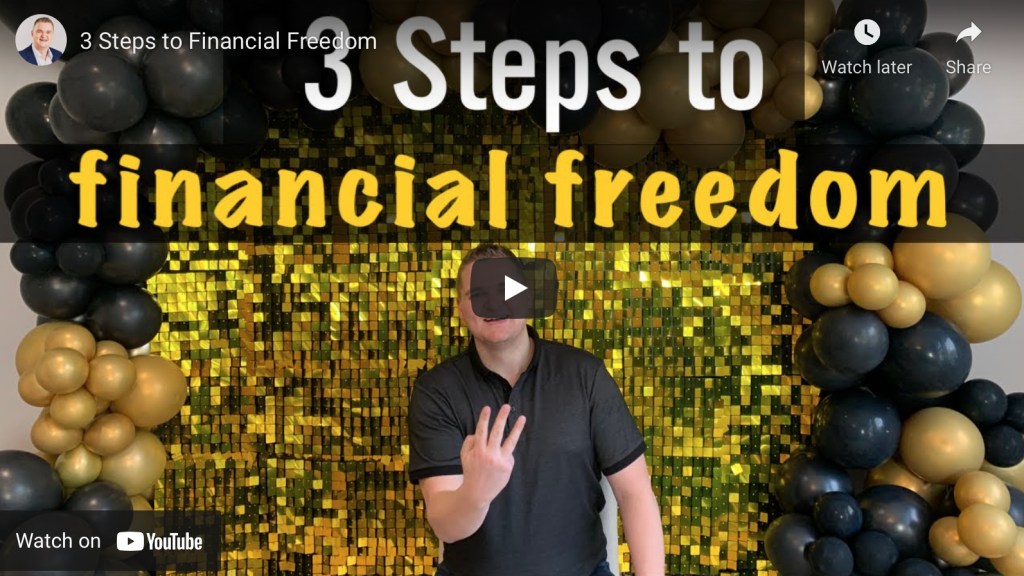3 Steps to Financial Freedom
Guess who turned 30 this month? Yes, I am no longer in my twenties! My birthday was jam-packed with exciting activities, including a party and paragliding the following day. But I figured it wouldn't be a complete day without doing what I love most, teaching others about property investing.
If you're new to my channel or blog, my name is Samuel Leeds, and I've been dealing in property for almost half my life. I bought my first house when I was 17. And since then, I have not only achieved financial freedom but have also become a multimillionaire!
I became financially free at the age of 21, which was pretty early in my property journey. So in celebration of my 30th birthday, I wanted to share some of the things I did to achieve this. And I have narrowed them to three things.
1.Reduce Your Living Expenses
Now, this might be contrary to what you see from YouTube influencers and property gurus, including me. You might see me in my Range Rover and my big house and forget that I didn't start out like this. I wasn't always a multimillionaire.
It's important to consider what the people who inspire you did in their early days to be where they are today. Just as you emulate their today habits, you should also emulate their past habits. And one thing for sure, they didn't start out living luxuriously.
Am I saying you should live in poverty, not spoil yourself, and not have any nice things? Absolutely not. I'm only advising that, to begin with, you reduce your monthly expenses to as low as they can be. Here's how to get started:
- Get a pen, paper, and your bank statement.
Write down your current average monthly spending
- Determine how low that figure can go. You might be thinking, “it's already as low as it can get.” But your expenses can always go lower. Go through your standing orders and direct debits. You might still be paying for services you no longer use or need.
My dad had to close his English bank account when he moved to Brazil only to realize he had several subscriptions, including a subscription to a dating site, and he was now married! Also, a friend of mine just recently found out he had been unknowingly paying for his gym membership throughout the lockdown.
So which unnecessary expenses do you have? Do you really need a second car? Would you consider shopping at Asda instead of Waitrose, one of, if not the cheapest and most expensive supermarkets in the UK respectively? I worked out how simply I could live my life when starting my financial freedom journey too. Then set out to earn that tremendously reduced figure in passive income, and look at me now.
2. Manage Your Money
Now, this may sound rather obvious and cliche, but it's worth mentioning. By managing money, I mean paying yourself first. Usually, when people receive their salary, they immediately pay their bills (e.g., mortgage, rent, power, and gas), then save what's left. But how much is usually left? Nothing or just a few quid, which they blow shortly after.
And this is why you'll hear most people say, “if only I earned a little bit more, I'd be able to save.” But in reality, if they were to earn more, their cost of living would go up, and the “if onlys” would continue. So how do you get around this? Pay yourself first and manage your money better.
Back in the day, I went to a financial education seminar called Millionaire Mind Intensive by a guy named Harv Eker. He taught an excellent money management system, which I said I would do, but never did. The following year I went back, heard the same exact teaching, set out to do it but didn't. I attended the seminar for the third time, received the same money management lesson, but this time I was like, “I already know that.”
Quite a dangerous statement that one, according to the trainer. Because unless you're doing it, you don't know. So this time, I went home and did as he had been teaching all along. And this is what I did.
- Set up separate bank accounts. I opened six bank accounts, namely necessities, play, education, giving, investment, and savings bank accounts.
- The bank accounts don't have to be with different banks. You can have different eSavers.
- Split your monthly income into the different bank accounts you have. You can put 50% of your income in the necessities account, and in each of the others, 10% of your earnings.
By doing this, you will have exceedingly better control of your finances. There are so many reasons you could give as to why this is impossible. Take Carl, for example. A former student of one of my property investors crash courses, where I also taught this money management system.
You see, unbeknownst to me, Carl was upset with me for even suggesting he only use 50% of his wages for his necessities. Then a cleaner earning only £1,200 a month with £1,250 expenses, Carl was already spending more than he was making! So my teachings from his point of view only applied to rich people, which understandably upset him.
However, by the end of the course, Carl decided instead of setting aside 50% of his salary for necessities, he would set aside 95% and put 1% into the other accounts. Carl shrunk his expenses even lower, and three years later, he was financially free thanks to regaining control of his finances and paying himself first.
Whether you're naturally a spender or a hoarder, use this system to take control of your finances. You don't need more money; you need to manage the money you have. The Bible says, “whoever can be trusted with very little can also be trusted with much.”
3. Think Passive Rather Than Active Outcome
Instead of thinking about how you can get more money, try to create passive income streams. Passive income is money you earn from a source that requires little to no effort on your end. These include book royalties, affiliate marketing, stocks, shares, investments, especially property investments.
How many times do you have to buy a property before it starts giving you rent? Once! Property investment will not only earn you rent forever, but its value will also appreciate. By reducing your living expenses and taking control of your finances, you'll have money to invest in something that can give you passive income.
Getting passive income will allow you to put even more in your investment account, and gradually it will replace your active income, which will mean you have attained financial freedom. So cut your monthly expenses, manage your finance, and focus on passive income. Happy 30th birthday to me!!
Claim Your FREE Ticket to the Property Investors Crash Course: https://property-investors.co.uk
#financialfreedom #millionaire #success





